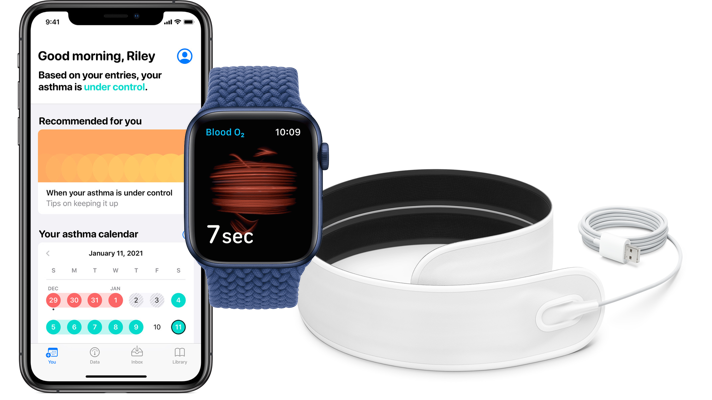The 900-participant study uses learnings from Apple’s Tueo Health acquisition and could inform the development of a digital biomarker for asthma.
Tueo Health, a Rosenman Innovator company, was acquired by Apple. Read the original story at Mobi Health News.
Apple and Anthem, along with the University of California, Irvine, and software company CareEvolution, have teamed up to launch a two-year, 900-participant study investigating how digital tools can help patients control their asthma and reduce hospital utilization.
“The Digital Asthma Study brings together Apple Watch’s innovative technology with an engaging app-based self-management experience to investigate how consumers can better manage and control a prevalent condition,” Myoung Cha, Apple’s head of Health Strategic Initiatives, said in a statement. “We hope this study can help the medical community produce new insights about asthma control and can identify effective digital tools that can help empower people around the world to better manage their condition.”
All participants in the invitation-only study will receive an Apple Watch and a Beddit sleep monitor. But only the intervention group will have access to an app designed to improve their asthma control. Participants will be compensated with the opportunity to keep their devices, as well as small monetary incentives in the form of gift cards.
HIMSS20 Digital
Learn on-demand, earn credit, find products and solutions. Get Started >>
The app includes educational materials: 65 short educational modules, including articles and videos created by Apple, building partly on the expertise from the company’s 2019 acquisition of Tueo Health. It also includes a daily survey and passive monitoring from the Watch and the Beddit device. Combined, these inputs will allow the app to give the user updates on their asthma control, including alerts when sensor values fall out of a desired range.
Users can also print out a special report view of their data designed for their healthcare provider.
The first year of the study will look at active engagement with the apps, while the second year will include occasional follow-ups to assess the long-term value of the intervention.
Anthem is sponsoring the study financially and has also contributed thought leadership about strategy and relevant outcomes. UC Irvine is conducting the IRB-approved clinical study, and CareEvolution is managing the app and the storage of study data.
“As part of our mission of improving people’s lives, we are making it easier for consumers to proactively manage their health through our digital-first approach to delivering healthcare solutions and services,” Rajeev Ronanki, chief digital officer at Anthem, said in a statement. “Millions of Americans are struggling with their asthma condition each day and we’re thrilled to collaborate with UCI, Apple and CareEvolution on studying new solutions.”
The primary outcome measures will show how the app users’ asthma control and hospital utilization differ from the control group.
But, reminiscent of how Apple Heart Study data ended up supporting the development of Apple’s FDA-cleared algorithms, this study has a secondary goal of helping Apple develop a digital biomarker for asthma control. This biomarker could be used to create an early warning system, similar to Apple’s current offerings around irregular heart rhythms and fall detection.
